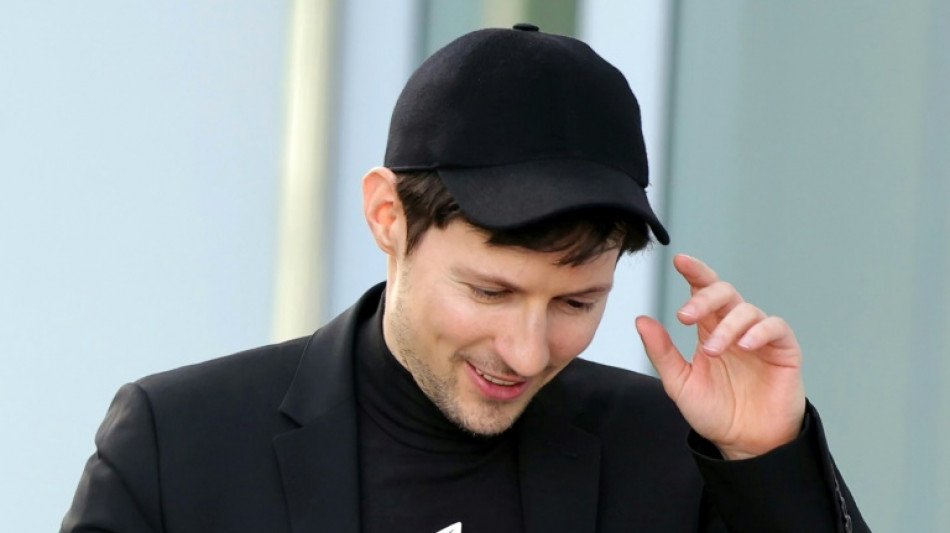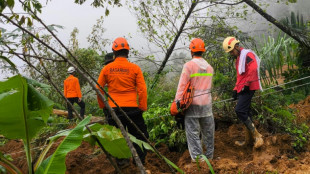

Telegram boss admits 'seriousness' of French allegations: source
Telegram founder Pavel Durov has told investigating magistrates in France, where he is charged with multiple infractions linked to enabling organised crime, that he "realised the seriousness of all the allegations", according to a source close to the case.
Extracts from Durov's questioning in December through an interpreter after his August arrest, seen by AFP, show that he initially blamed French authorities for failing to alert Telegram to alleged criminal activity.
"My location and my personal Telegram account were known to the French authorities" including "the president's office and the French consul in Dubai", Durov said, also mentioning "an agent with the DGSI", France's domestic intelligence service.
He claimed that the agent said Paris was satisfied with Telegram's cooperation, but that other investigating services had used "the wrong email addresses" to report suspected crimes on the platform.
The 40-year-old added that he had done his "best" to take "appropriate" action to address such reports.
On December 6, during his first in-depth questioning, Durov nevertheless admitted that "it was while I was held in custody that I realised the seriousness of all the allegations".
- Not created 'for criminals' -
The messaging service Durov founded with his brother in 2013 "was not created to be a platform for criminals", he said.
"Its growing popularity, the overall increase in the number of our users, meant that the number using Telegram for criminal purposes also increased," added the Saint Petersburg-born billionaire.
Durov possesses multiple passports including a French one, although he does not speak the language, claiming to have been granted the nationality by President Emmanuel Macron.
When judges asked whether Telegram checked users' identities or documents, Durov responded: "No".
"I think that's the case for all messaging services," he added.
Durov also said that encryption of certain Telegram messages was "standard for the industry" – adding that it was intended to prevent Telegram itself gaining access to users' messages and to prevent a data leak.
Investigators confronted Durov during his custody with more than a dozen specific cases, ranging from child abuse to drug trading, scams, arms sales and the hiring of hitmen.
It is these crimes, in some cases organised, that are at the root of the complicity charges against the platform boss.
Durov said that he "disagreed" with the judges' claim that Telegram's ease of use made it much more practical for organised criminals than alternatives such as the dark web.
- 'Effective' measures -
Its "effective" measures against criminal abuse helped remove 15 to 20 million user accounts and up to two million channels or groups from the service each month, he said.
Instead, Durov again blamed legal authorities or associations for failing to correctly report alleged criminal activity.
One such association, the American National Center for Missing and Exploited Children (NCMEC), told investigators it had made 400 reports to Telegram in 2023 alone.
Durov acknowledged the contacts, saying Telegram had struck deals with both the US group and a British equivalent.
Mentioning both the direct reports and media reporting on abuse of the platform, investigators asked why Durov had not intervened before he was actually arrested.
He responded that there was "never anything solid" in the newspapers.
Magistrates especially pressed Durov on Telegram's "People Nearby" feature, which was disactivated following his arrest.
People were suspected of using it to provide illegal services using geolocalisation, such as supplying drugs or pimping.
"In most countries, this function is used for good purposes, not for illegal ones," Durov said.
One magistrate responded: "France might be unique in terms of gastronomy, but certainly not in matters of criminality."
Dubai-based Telegram announced its first-ever annual profit in December.
But Durov told investigators that it was labouring under a $2 billion load of debt.
Nevertheless, "we are committed to improving our moderation processes," he vowed, echoing a promise he made publicly in September to work more closely with authorities.
Data provided by Telegram suggest that it handed over vastly more data on users to national authorities in the third and fourth quarter of 2024 – covering the time of and the immediate aftermath of Durov's arrest.
"My teams have made a lot of progress," offering up identifying information about "more than 10,000 users" in the first six months of last year, Durov said. The platform claims to have 950 million registered accounts.
Durov is set to face further questioning by magistrates probing his claims about how moderation and content removal works on Telegram.
林-L.Lín--THT-士蔑報




